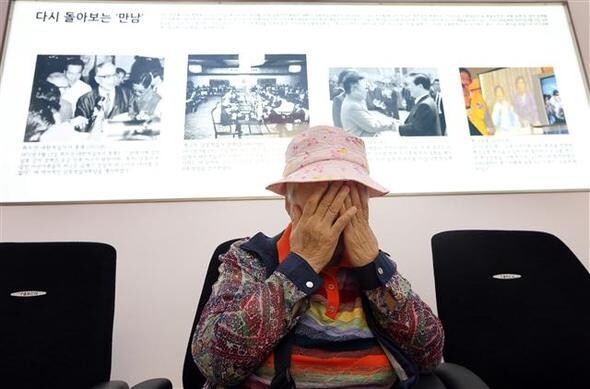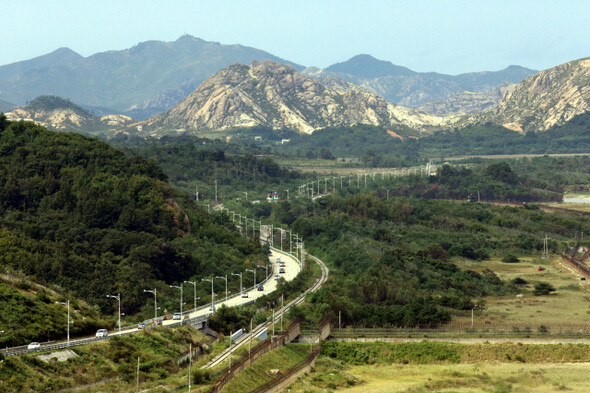hankyoreh
Links to other country sites 다른 나라 사이트 링크
The outcome of N. Korea canceling family reunions

By Kang Tae-ho, senior staff writer and Ha Eo-young, staff reporter
With North Korea’s unexpected and unilateral on Sept. 21 decision to indefinitely delay the scheduled reunions of families divided by the Korean War, inter-Korean relations are rapidly growing chillier. The South Korean government criticized the delay as “inhumane,” while Pyongyang responded that South Korea was responsible.
The Hankyoreh contacted some experts on diplomatic and security affairs to hear why inter-Korean relations - which had appeared to be thawing - suddenly got worse; what can be done to resolve the latest setback; and what the prospects are for the six-party talks, which are still stuck in limbo.

■ Why did North Korea delay the reunions?
The experts agreed that the delay was North Korea’s strategic response to the South’s passive attitude toward resuming tours to Mt. Keumgang and that it was an attempt to take back the lead in inter-Korean relations.
“Pyongyang had wanted to hold talks about resuming tours to Mt. Keumgang before the reunions, but the South pushed them back till afterward,” said Jeong Se-hyun, former Unification Minister and current president of Wonkwang University. “The North concluded that Seoul was going to hold the reunions without moving forward on Mt. Keumgang tours or humanitarian aid, as happened during the administration of former president Lee Myung-bak.”
In Jeong’s analysis, the North did not believe that the South would provide adequate compensation for holding the reunions, even though the reunions could have a negative political influence on the North Korean regime.
There are also those who believe that Pyongyang intended the delay as a warning that it would not give up the lead in inter-Korean relations. Observers had suggested that North Korea had followed the wishes of South Korean President Park Geun-hye during the process of reopening the Kaesong Industrial Complex.
“Pyongyang seems to have realized that Park has more or less taken the lead in inter-Korean relations,” said Kim Yong-hyun, professor at Dongguk University. “It looks like Pyongyang determined that if it does not pay closer attention to relations with the South, the South might keep the lead for the next five years.”
The experts had differing opinions, however, about North Korea meant when it referred to the case of Unified Progressive Party lawmaker Lee Seok-ki in its announcement that it was delaying the reunions.
“North Korea has indicated that while relations with Seoul are important, its connections with collaborators and supporters in South Korea are important as well,” said Yoo Ho-yeol, professor at Korea University.
But Jeong Se-hyun had a different take on this point. “If this leads to increased anti-North Korean sentiment, it would make it difficult both to improve inter-Korean relations and resume tours to Mt. Keumgang,” Jeong said. “The North’s reference to the Lee scandal in its announcement is far from its actual intentions.”

■ How can the South repair its strained relations with the North?
Concerned that the new strain in inter-Korean relations could become prolonged, the experts said that the South must be flexible and make an effort to engage the North in dialogue.
“The statements from both North Korea and South Korea’s Unification Ministry were emotional,” said Kim Geun-shik, professor at Kyungnam University. “We should learn from the mistakes made during the process of resuming operations at the Kaesong complex and take the initiative to propose more talks about reunions for divided families and tours to Mt. Keumgang. If North Korea decides that there is a possibility of linking the two projects, it might respond right away.”
“If we are to improve inter-Korean relations, we have to resume tours at Mt. Keumgang,” said Kim Yong-hyun. “South Korea needs to treat this as an opportunity to show its sincerity and demonstrate its flexibility by offering to resume tours to the mountain.”
“Since the Kaesong Industrial Complex is operating, inter-Korean relations will not return to the way they were in April,” Kim predicted.
There were also quite a few experts who argued that Park must not cling to any particular set of principles if talks between the two Koreas are to reopen.
“The government should not take an ‘eye for an eye’ approach with North Korea,” said Kim Chang-soo, chief of research at the Korea National Strategy Institute. “Instead it should take the high road by allowing private organizations to engage in joint activities with North Korea and increasing humanitarian aid to the North. Doing this will give both North and South an excuse and a reason to resume inter-Korean talks.”
“Only by acting in this way will Park’s government be able to gain the ‘trust’ from North Korea that it keeps talking about,” Kim said.
“Park’s administration has a strong tendency to seek concessions from North Korea on every issue, including reopening the Kaesong Complex, holding reunions for divided families, and resuming tours to Mt. Keumgang,” said Paik Hak-soon, senior researcher at the Sejong Institute. “The Unification Ministry referred to the delay of the reunions as ‘inhumane,’ but this kind of language will only make it more difficult to resolve the problem.”
■ What is happening with the six-party talks? How can they be fixed?
Most of all, experts called for the US to play a bigger role in the six-party talks. The US, they said, holds the key to resolving the issue of North Korean nuclear weapons.
“Pyongyang announced its two-track policy for building a nuclear program along with its economy and has taken active steps toward dialogue about resolving the nuclear issue, while Chinese president Xi Jinping has come forward to directly urge US President Barack Obama to resume the six-party talks,” Paik Hak-soon said. “If the Obama administration avoids these talks and misses this golden opportunity, it would be tantamount to abandoning its role on the Korean peninsula.”
There were also some experts who argued that while the US plays an important role in moving toward the six-party talks, it will take time before the US can take part in the talks.
“Since North Korea views its possession of nuclear weapons as fait accompli, it is attempting to adopt a framework for negotiations that is different from the past,” said Kim Geun-shik. “The US, on the other hand, wants to go back to the Feb. 29 agreement from 2012.”
“To end this standoff, under-the-table contact between the Pyongyang and Washington should be used so that North Korea can demonstrate that it intends to denuclearize and so that the US can take part in the six-party talks,” Kim said. “For now, it appears that it will take time before we can reach that point.”
In addition, there were analysts who were very doubtful about the prospects of the six-party talks because of the US’s negative attitude toward them.
“The US is moving not toward denuclearization of North Korea but rather toward non-proliferation of nuclear weapons,” said Jeong Se-hyun. “If North Korea were to get rid of its nuclear weapons, the US would lose a big market for weapons - South Korea. Since this would have a negative effect on the US economy, the US does not want the North to denuclearize.”
“There are a lot of people in the South Korean government who think Korea should bow to the wishes of the US,” Jeong added. “In terms of domestic politics, if inter-Korean relations improve, the conservative establishment will not be able to remain unified.” Jeong believes that neither the US nor South Korea will take active part in the six-party talks for the time being.
Please direct questions or comments to [english@hani.co.kr]

Editorial・opinion
![[Column] Has Korea, too, crossed the Rubicon on China? [Column] Has Korea, too, crossed the Rubicon on China?](https://flexible.img.hani.co.kr/flexible/normal/500/300/imgdb/original/2024/0419/9317135153409185.jpg) [Column] Has Korea, too, crossed the Rubicon on China?
[Column] Has Korea, too, crossed the Rubicon on China?![[Correspondent’s column] In Japan’s alliance with US, echoes of its past alliances with UK [Correspondent’s column] In Japan’s alliance with US, echoes of its past alliances with UK](https://flexible.img.hani.co.kr/flexible/normal/500/300/imgdb/original/2024/0419/2317135166563519.jpg) [Correspondent’s column] In Japan’s alliance with US, echoes of its past alliances with UK
[Correspondent’s column] In Japan’s alliance with US, echoes of its past alliances with UK- [Editorial] Does Yoon think the Korean public is wrong?
- [Editorial] As it bolsters its alliance with US, Japan must be accountable for past
- [Guest essay] Amending the Constitution is Yoon’s key to leaving office in public’s good graces
- [Editorial] 10 years on, lessons of Sewol tragedy must never be forgotten
- [Column] A death blow to Korea’s prosecutor politics
- [Correspondent’s column] The US and the end of Japanese pacifism
- [Guest essay] How Korea turned its trainee doctors into monsters
- [Guest essay] As someone who helped forge Seoul-Moscow ties, their status today troubles me
Most viewed articles
- 1[Column] The clock is ticking for Korea’s first lady
- 2Hong Se-hwa, voice for tolerance whose memoir of exile touched a chord, dies at 76
- 3After 2 months of delayed, denied medical care, Koreans worry worst may be yet to come
- 4[Column] Has Korea, too, crossed the Rubicon on China?
- 5US overtakes China as Korea’s top export market, prompting trade sanction jitters
- 6Samsung barricades office as unionized workers strike for better conditions
- 7All eyes on Xiaomi after it pulls off EV that Apple couldn’t
- 8[Correspondent’s column] In Japan’s alliance with US, echoes of its past alliances with UK
- 975% of younger S. Koreans want to leave country
- 10[Correspondent’s column] The US and the end of Japanese pacifism